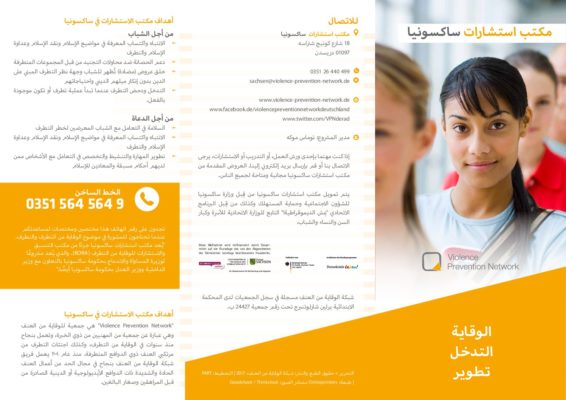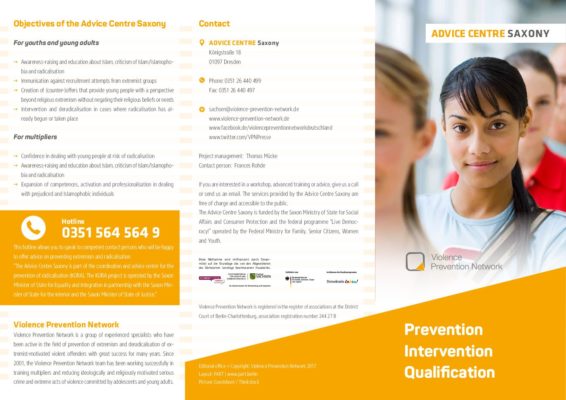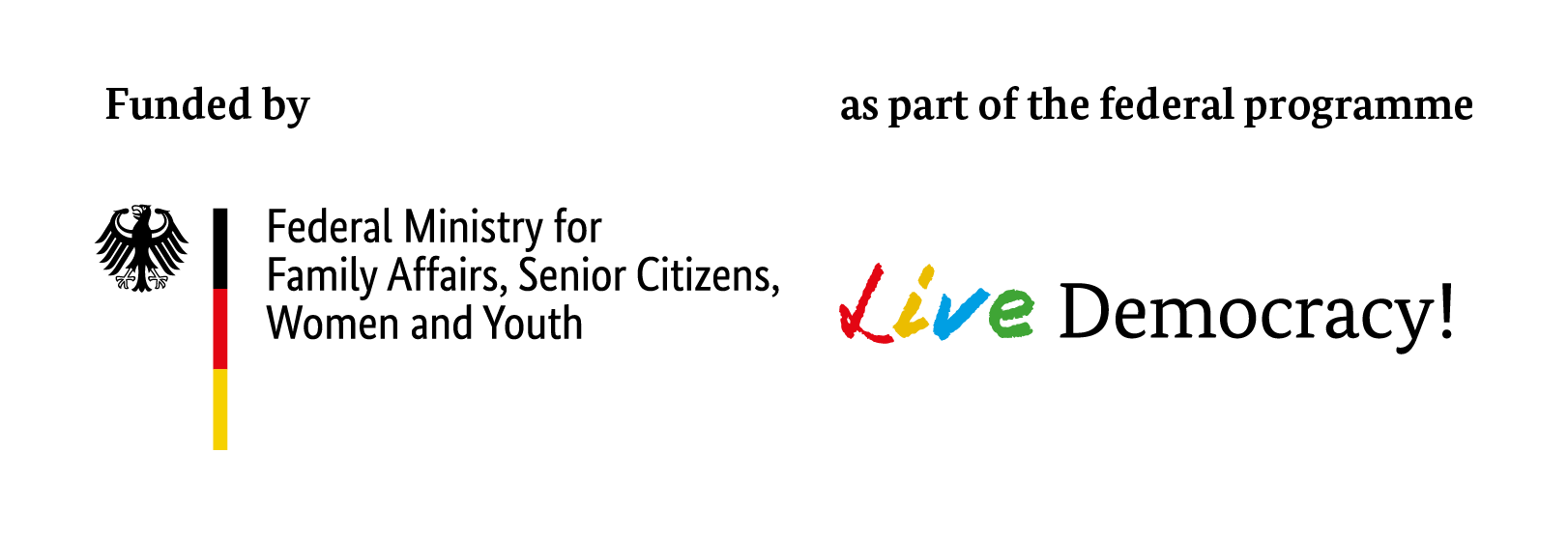Services of the Advice Centre Saxony
I: Intervention, distancing advice/assistance
- Advice and assistance for young people at risk of radicalisation
- Support for scene members and returnees from war zones
- Advice through outreach approaches and building a relationship of trust for concrete relationship work
II: Advising and coaching of institutions to strengthen competence in dealing with (religiously based) conflicts
III: Training for multipliers
Prejudice, discriminatory and extremist attitudes can lead to radicalisation – this is a problem for society as a whole. Violence Prevention Network’s Advice Centre Saxony offers individually adapted, interactive training formats. Together, we develop options for dealing with challenging situations in your everyday working life. Using exercises, case studies, video and image analyses and moderated discussions, we create spaces for exchange and debate. We support developing and designing inclusive (public) spaces. The aim is to strengthen accessibility and to promote openness and participation. We can work on the following modules together with you; focal points and individual contents are determined individually:
Islam in society, perception and debates
- Muslim life in Saxony and Germany
- Basic concepts and religious everyday life
- Identity, values and norms
- Reflecting on gender roles and promoting equality
- Acting with awareness of prejudice and creating opportunities for participation
Dealing with religiously based extremism
- Recognising radicalisation and understanding the background
- Be sensitive to online radicalisation and prevention in the internet
- Acting in a solution-oriented way in cases of (alleged) radicalisation
- Strengthening and supporting young people
(Anti-)discrimination and radicalisation prevention
- Understanding forms, causes and consequences of group-based misanthropy
- Counteracting ideas of inequality and strengthen diversity
- Recognising prejudice-related language and communicating in a discrimination-sensitive way
- Perceiving one’s own role and creating opportunities to shape it
IV: Empowerment workshop for Muslims with (ascribed) experience of flight/migration history
Muslims in Saxony are affected by discrimination in several ways: Anti-Muslim racism can work together with classism, sexism and language barriers. The workshop creates a space where experiences can be shared. Together, the participants will develop strategies for action. The workshop is led by Muslims who are themselves affected by multiple discrimination.
V: Workshops for young people
Specific prevention work against the consolidation of enemy images: Depending on the target group, age and level of knowledge, the following topics can be worked on with your school class/youth group:
Topic 1: Diversity as a resource
- Identity: What has shaped me, what makes me me?
- Values, norms, religion and faith: What is important to me?
- Gender roles and equality: How do we want to live?
- (Anti-)discrimination and hostility towards Muslims: How can I react?
- Radicalisation and ideologies: What does this have to do with me?
Topic 2: Media skills – Fake News
- What are Fake News?
- Who spreads fake news and for what reasons?
- What strategies do protagonists use on the internet?
- How can I recognise image manipulation?
- How can we design digital communication spaces (e.g. class chat)?
Pedagogical goals of the workshops:
- Strengthen ambiguity tolerance
- Reflection of images of others and of oneself
- Promoting self-confidence and empathy
- Stimulating changes of perspective
- Developing strategies for dealing with conflicts
- Enabling students to position themselves in a pluralistic society
- Responsible behaviour in the online and offline worlds
Violence Prevention Network’s Advice Centre Saxony addresses people with questions in the field of religiously based extremism. It offers prevention, intervention and deradicalisation measures for those affected by religious extremism. The Advice Centre Saxony promotes the strengthening of tolerance of different world views as well as the early detection, prevention and reversal of radicalisation processes. Intervention in incipient radicalisation processes and targeted deradicalisation work start where people seek a way out of extremist ideologies.




